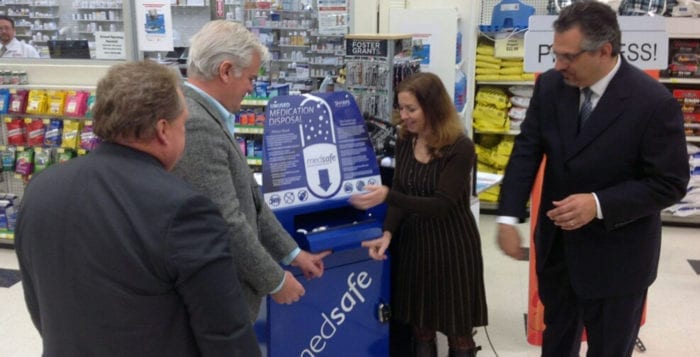By Kevin Redding
With the recent launch of the first statewide pharmaceutical take-back initiative, New York residents are encouraged to be more careful, and environmentally friendly, when it comes to getting rid of their old and unwanted medications.
On Dec. 28, the New York State Department of Environmental Conservation announced that 80 retail pharmacies, hospitals and long-term care facilities across the state will be the first to participate in its $2 million pilot pharmaceutical take-back program, and encouraged more to get on board.
This program allows residents to safely dispose any unused and potentially harmful pills into a drop box at these locations beginning in April, when the boxes are slated for installation.
Once collected, the drugs will be weighed, tracked and incinerated.
The free, volunteer public service, funded by the state Environmental Protection Fund, is modeled after a successful safe disposal program started at King Kullen in 2014 — which, in the past three years, has safely disposed more than 7,600 pounds of pharmaceutical drugs — and aims to improve the region’s drinking water, which has become increasingly contaminated by people flushing medications down the toilet and pouring them down the sink.
Flushed pharmaceutical drugs have been found in state lakes, rivers and streams, negatively affecting the waterways and the wildlife that inhabit them.
Roughly 40 percent of groundwater samples have trace amounts of pharmaceutical drugs, with the most common being antibiotics and anticonvulsants, according to Adrienne Esposito, executive director of Citizens
Campaign for the Environment.
“Prescription drugs should come from our pharmacists — not from our faucets,” said Esposito, whose Farmingdale-based organization founded the King Kullen program and lobbied the state to provide funding in its budget in 2016 for the DEC to create the pilot program. “Pharmaceutical drugs are considered an ‘emerging contaminant’ in our drinking water and the flushing of unwanted drugs is one contributor to this growing problem. Safe disposal programs [like this] are critical in combating this health risk. The goal really is to provide people with an easy, safe and convenient option to dispose of their drugs. We can get ahead of this problem now rather than wait until it becomes a bigger problem later.”
The pilot program is currently open and is accepting applications, according to the DEC website, which also outlines that the $2 million will be used to cover the full cost of purchasing U.S. Drug Enforcement Administration-compliant medication drop boxes, as well as the cost of pickup, transport and destruction of collected waste pharmaceuticals for a two-year period.
Esposito said the program also serves to prevent accidental exposure or intentional misuse of prescription drugs.
“This is a service that all pharmacies should be providing their customers,” she said. “Not only does it protect the environment, it will keep drugs out of the hands of people who shouldn’t have them.”
While there aren’t many participants so far in Suffolk — among six volunteers are Huntington’s Country Village Chemists, St. James Rehabilitation & Healthcare Center and Stony Brook Student Health Services — many local pharmacy owners said they were interested in enrolling, while others have already been offering something similar.
At Heritage Chemists Pharmacy & Boutique in Mount Sinai, owner Frank Bosio said he offered a take-back box for more than two years, but funding ended.
“It was a great program and the community loved it,” said Bosio with interest in enrolling in the new pilot program. “I definitely want to get on board with this.”
Manager of Echo Pharmacy in Miller Place, Beth Mango, said her store has a disposal box system in place that complies with Drug Enforcement Administration requirements.
“We had a lot of customers asking us what they could do with their old medications,” Mango said. “We wanted to do something for the community. We’re trying to save our Earth for our children and for future generations — this is one way we know is safe.”
Esposito made clear that most disposal systems outside of the launched program aren’t authorized by the DEC or other agencies, and hopes the list for this particular effort will grow.
Retail pharmacies, hospitals and long-term care facilities can enroll to participate in the pilot pharmaceutical take-back program on the DEC’s website at www.dec.ny.gov/.





